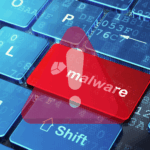Malware-as-a-Service Is Using Microsoft Teams to Launch Attacks
Introduction
Microsoft Teams has become a staple in modern workplaces, helping employees communicate and collaborate more efficiently. Do you use it to communicate with your coworkers? Send files more quickly to other departments? Schedule meetings that will remind you before they happen?
All over the world, over 320M people use Teams. While the platform may feel like a safe, internal environment, hackers have found ways to exploit that trust. Unfortunately, some threat actors have started using it as a launchpad for sophisticated social engineering attacks that unleash malware-as-a-service.
So what are social engineering and MaaS, and how are these threat actors propagating them through Microsoft software? Let’s dive in!
How the Attacks Are Happening
In a recent tidal wave of cyberattacks, threat actors impersonate IT helpdesk personnel during external Microsoft Teams calls. Once on a call, they then employ classic social engineering tactics to convince the victim to launch Microsoft’s Quick Assist tool, a legitimate remote support utility.
From there, they walk the employee through running a script that appears to contain a harmless update…but which really installs malware on the machine. Because this method sidesteps traditional email-based phishing filters, it can catch even cautious users off guard!
The malware they’re installing is called Matanbuchus; a dangerous type of malware-as-a-service. Think of MaaS like a subscription to cybercrime: attackers pay to access powerful malware tools that can be customized and deployed, without needing deep technical skills.
The Matanbuchus Payload
In this case, attackers used MaaS to drop a “payload.” This refers to the part of the malware that performs the real damage.
In these attacks, the payload includes a combination of:
- Renamed Notepad++ updater (to appear legitimate),
- tampered XML configuration file, and
- a malicious DLL file (a type of software component) side-loaded to bypass security checks.
Once installed, this malware can steal data, open backdoors, or lay the groundwork for even more destructive attacks (like ransomware). Like MaaS, threat actors can also purchase packaged ransomware on the Dark Web.
What You Can Do to Stay Safe
Unfortunately, no single “patch” can prevent this kind of attack. Malware-as-a-service is sold on the Dark Web, making it difficult to shut down. Social engineering tactics meanwhile use increasingly smart methods to avoid detection, not exploiting a traditional software flaw, but rather going after human trust and behavior.
That means defense requires a layered approach:
- Pay attention to your awareness trainings, especially phishing courses that teach you how to recognize fake IT support calls and the dangers of blindly following instructions from unknown contacts (even on familiar platforms like Teams).
- Restrict or monitor your external Teams communications. Your organization may already limit who can contact you from outside the company.
- Be careful who is contacting you via remote access technology.
- Keep systems updated to ensure you’re not vulnerable to known exploits.
The more you understand about how phishing happens and best practices to recognize it, the more effectively you can spot, avoid and report these bad actors!
Conclusion
This attack epitomizes why cybersecurity is no longer just about firewalls and software updates; it’s about people. Tools like Microsoft Teams are invaluable for collaboration, but they can also be exploited if you don’t know how to think critically and act cautiously when you receive a suspicious message.
Phishing remains one of the most prevalent threats to users everywhere. Stay aware, stay cautious, and continue enjoying everything that these collaborative platforms have to offer—without sacrificing cybersecurity.
The post Malware-as-a-Service Is Using Microsoft Teams to Launch Attacks appeared first on Cybersafe.


